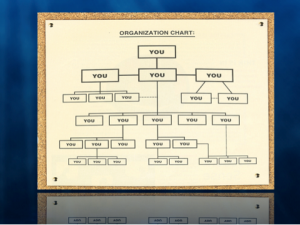
Top 10 Mistakes Of Corporate Coaches & How To Use Them To Explode Profits
Whenever I’m consulting with a client, I try to present all of my coaching suggestions in the most positive light possible…
I do this by highlighting the benefits my corporate clients can achieve through the prescribed changes and not dwelling on the often-stupefying mistakes that have led them to hire me.
I do it this way, not simply because it’s more pleasant (it IS), but because I think it’s the most effective way to motivate clients to make the changes and move forward.
They’ve already lived the mistakes, there’s nothing to gain from analyzing the flaws in their organization or leadership style over and over. That’s why they hired me. That’s my job.
Their job is to implement the changes, with a little help and guidance, to get their business back on the right track.
This is NOT a 10 Deadly Sins Article
Here’s the thing, because I like to approach these matters from a positive, results-based angle, I chose not to make this a piece about the “10 Stupidest Things Corporate Executives Do” or the “7 Deadly Sins of Entrepreneurs Who Think They’re God’s Gift to Business.”
Look, with the absolutely stupid, self-destructive, and borderline negligent things I’ve observed in my corporate coaching career, it’d be easy to write any of those articles. I could write books. But I won’t…
In the interest of better understanding exactly what many executives do wrong, AND what exactly corporate coaching professionals actually do, I’ve decided to flip the typical script. Here’s are the 10 major mistakes business consultants see on a recurring basis:
1. Leaders Don’t Have Clarity of Vision: If corporate leaders don’t understand why their company exists, then how can they teach that to their customers, employees, vendors, or funding partners? It’s time to revisit your mission statement, study it and/or make the appropriate changes.
Because your mission says why your company does what it does, this is a great place to renew your commitment to your company’s vision. One more thing: In order to really engrain this vision into your organization at every level, your mission statement needs to be distilled into a phrase so short and simple, it can fit on a t-shirt.
2. The Company Lacks Identity and Core Values: All outcomes are not the direct result of those at the top of the corporate ladder… but it does reflect on them.
Identifying core values are one of the most powerful ways that corporate executives can influence and guide the behaviors of their team. Although leaders can’t DO everything, they can and should create the values the guide employees on HOW to carry out these responsibilities.
3. The CEO Isn’t Big On Org Charts: Lots of executives pay lots of lip service to running a tight ship, but never seem to get around to creating or updating the company’s organizational chart.
An organizational chart clarifies who occupies what role and who reports to whom, and for what. A good organizational chart increases your company’s efficiency and, perhaps more importantly, defines responsibilities.
If a business leader fails to make an org chart, they typically start to absorb more and more responsibilities, until the company’s structural hierarchy looks like the chart below.
4. Employees Don’t Have Job Descriptions: I meet with executives all the time that tell me that they need to hire help. When I ask them what the person would do, however, they look at me like a deer in the headlights.
You can’t possibly hire the right person if you haven’t decided what you want them to do once they’re on board. So before even think about hold a single interview, you need to write a thorough job description. If you don’t, you’ll simply be wasting mountains of time.
If you’ve never written a job description before — you’d be shocked by how many corporate leaders haven’t — start by writing down everything you think you want your new employee to do. List the duties you want them to be responsible for. Next to each responsibility, write down the skill necessary to fulfill it. Be as specific as humanly possible.
Once you’ve taken inventory and created a skill set that defines your ideal employee… only then do you start scheduling interviews.
5. Leaders Confuse a Feature with a Benefit: Knowing the difference between a feature and a benefit is only useful for those in the marketing department. It’s absolutely critical that a company’s decision makers understand this concept as well.
Many of the mistakes we see in the corporate coaching world have to do with an executive’s love affair with an idea or product with a new feature. If that feature doesn’t provide an attractive benefit, or the company fails to position the products in a way that’s relevant to the benefits, massive resources can be quickly wasted.
6. Compensation: This one’s a big, sticky ball of wax. The main thing to remember here is that variable, performance-based compensation plans are no magic bullet — at all. In fact, more and more research shows that artificial pressures like bonuses and commissions don’t improve performance, the introduce stress that hinders it.
7. Leaders Don’t Communicate With Accounting Enough: Many executives have no idea what the “real” cost to run their business is. They don’t keep a close relationship with their accounting department and leave it up to “accounting” to make sure the numbers are good.
This is a lot like relying on the TV weatherman to deliver nice, partly cloudy skies. It works… until it doesn’t.
8. The Company Has Shinny Penny Syndrome: When leaders have a tendency to bounce like a pinball from one pet project to another, their businesses follow suit.
This will destroy profitability faster than just about anything else, because it draws resources away from the company’s core revenue sources. When you have several projects 50% done, that yields you zero revenue. However, one project 100% done brings money in the door.
9. Leaders Resist ALL Strategic Mergers or Partnerships: Look, not every merger, acquisition, or partnership that comes your way will be beneficial. However, the right partnership can send your company light-years ahead.
The thing we observe all too often in corporate coaching is a hostile attitude towards making beneficial alliances with likeminded companies. Even more damaging, this always seems to happen with companies that are struggling to take the next step.
If or when that company is able to make the progress its leaders desired, it’s out all the time and money it took them to do it all themselves. In a business landscape demanding “better, faster, more,” there’s no excuse for squandering resources.
10. The Company’s Leaders Avoid Confrontation: Too many executives are concerned about being well liked and have a terrible time making the tough decisions that are right for the business. If there is a problem, deal with it.
Even better yet, don’t allow potential problems to go unnoticed. If something unhealthy for your business seems likely to happen, jump on it before it becomes a serious issue. There is a potential problem, jump on it before it becomes a real problem.
Letting problems fester tends to lead to:
-Bad Deals
-Bad Employees
-Bad Company Morale
Takeaway: If you see yourself in even one of these items, it’s time to bring in someone to help you work through it. Corporate coaching exists for a reason. Running a business made up employees and rapidly changing markets is incredibly complicated — seek the advice of someone who’s seen it all before.


 25. Apr, 2012
25. Apr, 2012 


